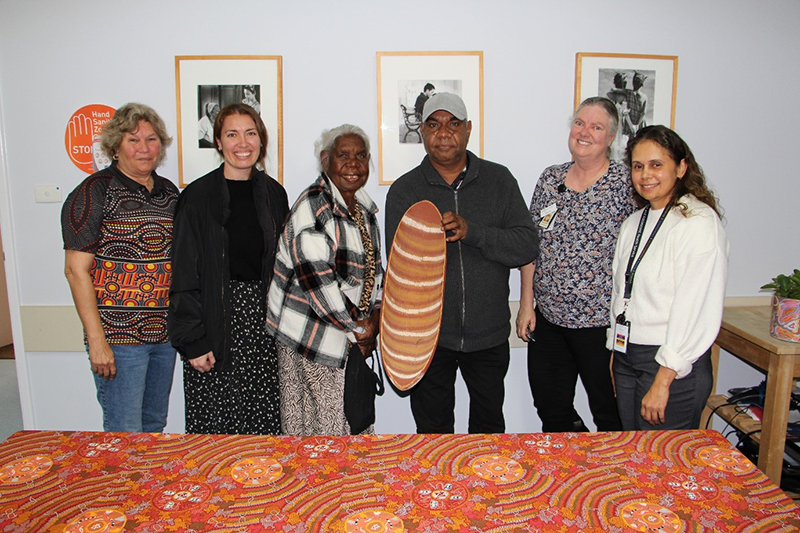The Mugbaloo (coolamon) is home
 (R to L) Kay Walley, Danielle Thurlow, Annie Milgin, Joseph Milgin, Valda Duffield and Rekisha Eades pictured with the Mugbaloo
(R to L) Kay Walley, Danielle Thurlow, Annie Milgin, Joseph Milgin, Valda Duffield and Rekisha Eades pictured with the Mugbaloo
Last month, the Director of Allied Health, Valda Duffield met with Cultural Leader Annie Milgin and her son Joseph Milgin from Nyikina Country, in hopes of returning the cultural artifact to its original owners. A cultural artifact that has been with Valda’s family for a long time. After a beautiful exchange, the Mugbaloo (coolamon) is now home, but not where Valda expected it to be.
The Mugbaloo - a carved vessel traditionally used to carry water, food or sometimes a baby - travelled with Valda’s grandfather. The Mugbaloo was safely carried by horse, boat and train from Mount Anderson Station to Bunbury where it was lovingly cared for and protected for many years. It’s thought the cultural artifact was given to Valda’s grandfather during his time as a Stockman at Mount Anderson Station, prior to World War I.
After Valda’s Grandfather passed, she decided the gift of the Mugbaloo was to be shared with her colleagues and patients at King Edward Memorial Hospital. Now safely homed in the Allied Health department and is brought out for many culturally significant events.
Over the past few years, Valda has been searching for a way to return the Mugbaloo home. Last month, she was able to meet with Cultural Leader Annie Milgin and her son Joseph Milgin from Nyikina Country where Mount Anderson station is located (culturally known as Jarlmadangah).
Annie lives and works on the 133,000-hectare Mount Anderson Station along with others from the Jarlmadangah community. She has worked as a health worker at the Jarlmadangah Clinic and continues to promote the use of bush medicines.
Annie kindly stopped in during her time in Boorloo to have a cuppa with Valda at King Eddies. On seeing the Mugbaloo, Annie recognised the striped patterns in which the rich colours of the red, yellow and white ochre were painted on the inside of the vessel. She said the way in which it was painted was common in Nyikina Country, these same colours and patterns are still used today. Annie’s son Joseph further mentioned the same colours are used to paint the people up for dance.
After sharing, Valda could not have been more sure of the origin of the Mugbaloo and asked Annie if she could return it home.
There was hardly a dry eye in the room when Annie and Joseph explained that the Mugbaloo must stay with Valda and only be handed down her family line. They went on to further explain that the Mugbaloo was a special gift to her grandfather and with her family, it belonged. They said it is part of their culture to give gifts to people who are special and that their ancestors would not be happy with them if they brought back a gift that did not belong to them.
Kay Walley, Senior Aboriginal Health Program Officer said, "It was an honor and privilege to witness this historical and sacred meeting between Valda and cultural leaders from Nyikina Country."
Rekisha Eades, Neonatology Project Officer said, "It was a privilege to be part of the Coolamon meeting and to meet the traditional custodians of where the Coolamon came from, a very calming experience for me."
Valda said, "This was not the outcome I expected and I had thought the Mugbaloo should go home. Now I understand that it is home, as it is now part of my family history and will be a treasured gift and legacy of my Grandfather's time at Mount Anderson".

